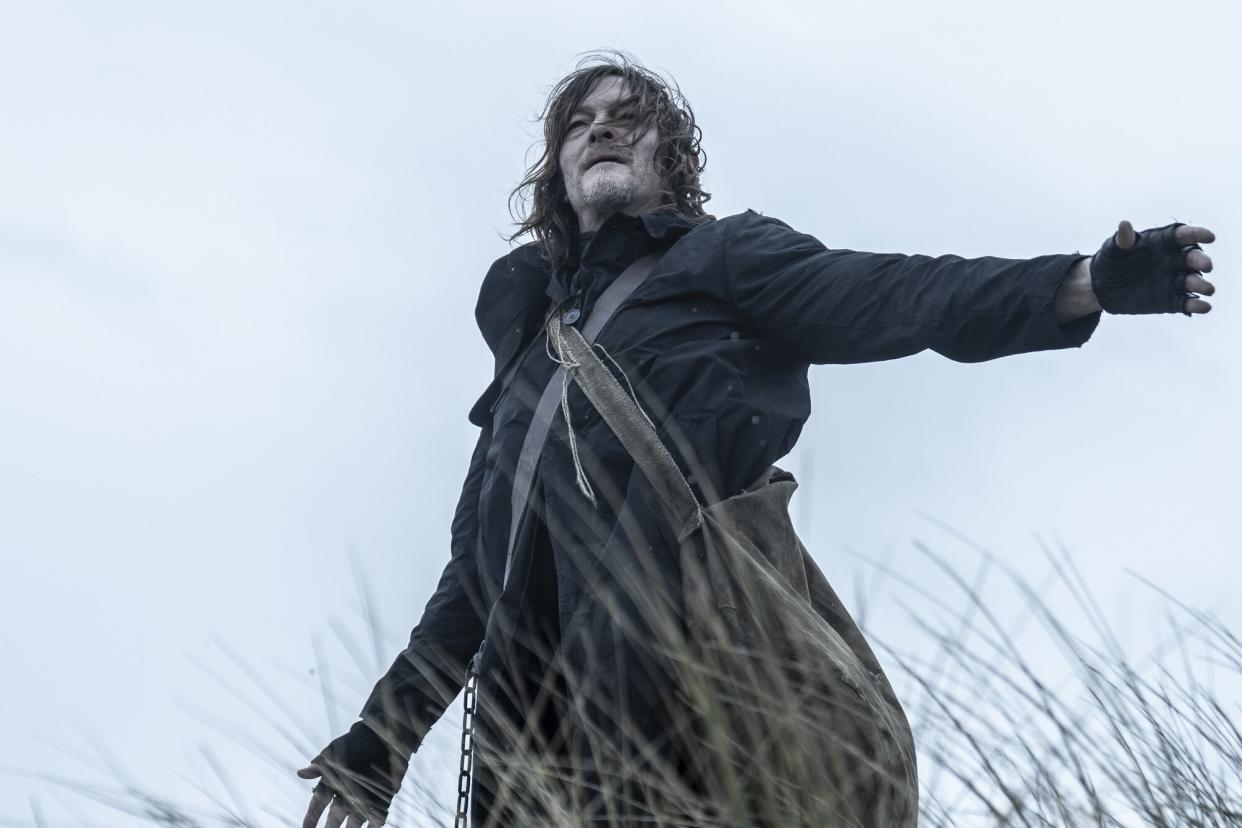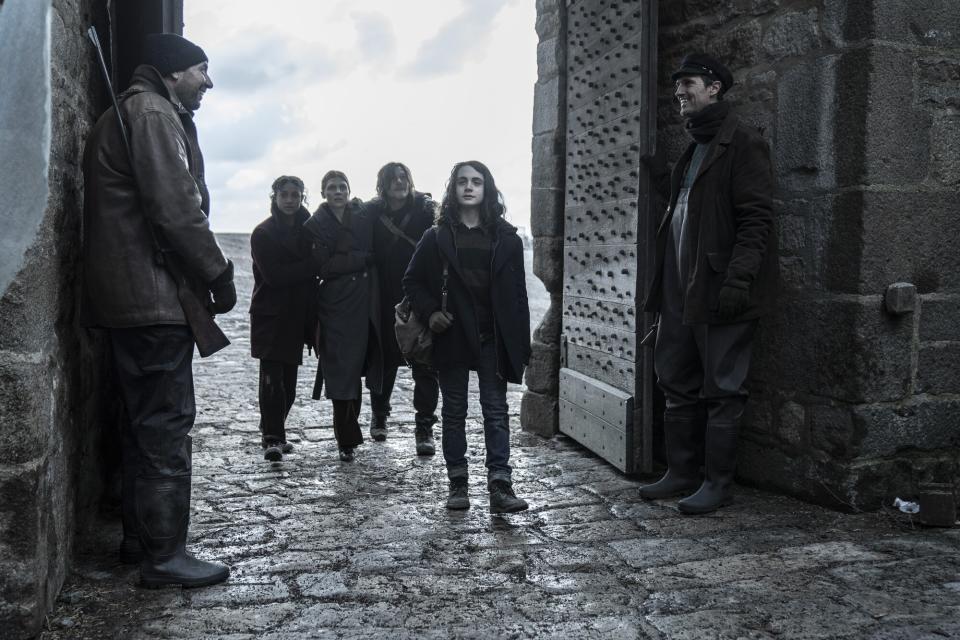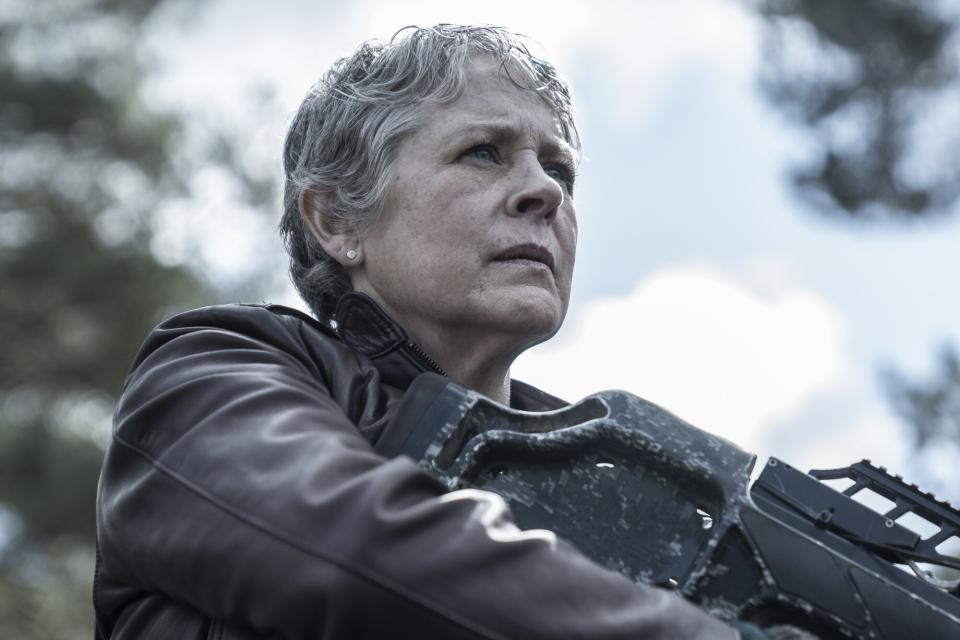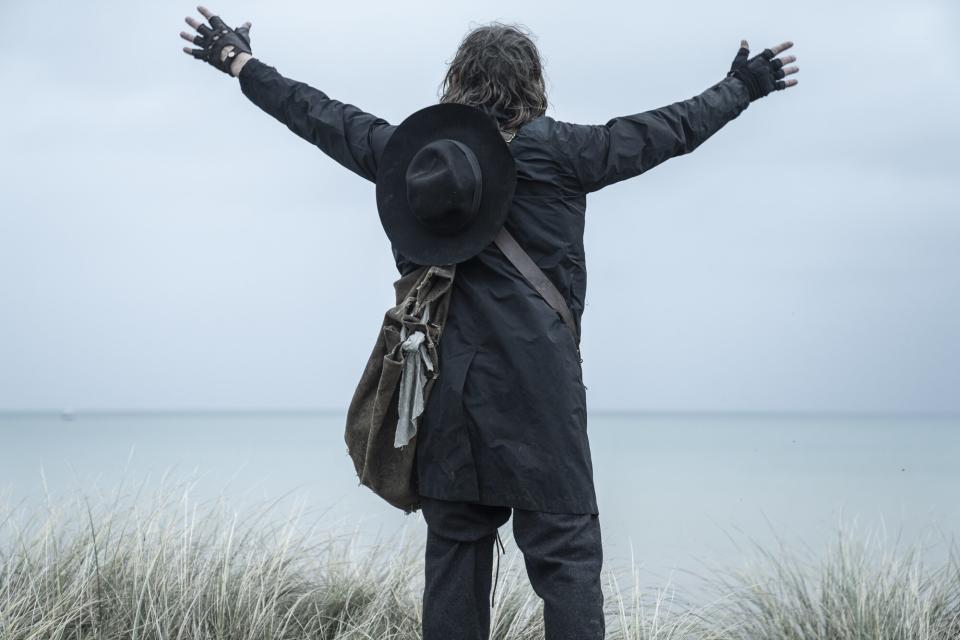“The Walking Dead: Daryl Dixon” final Carol scene explained

- Oops!Something went wrong.Please try again later.
- Oops!Something went wrong.Please try again later.
Warning: This article contains spoilers about the season 1 finale of The Walking Dead: Daryl Dixon, "Coming Home."
The first season of The Walking Dead: Daryl Dixon ended with our titular hero having to make a big choice. Having completed his assignment and delivered Laurent (Louis Puech Scigliuzzi) to the Nest, Daryl (Norman Reedus) went to board a boat to take him back home — finding his grandfather's World War II tombstone along the way.
But as the boat arrived, so did Laurent — leaving Daryl standing between one on each side and having to decide whether to return to his family back in the United States, or stay with his new French family that desperately needs his help.
And more help may be on the way. Because in the closing scene, we were transported back to Freeport, Maine, where a man riding Daryl's bike was being chased by a Ford Mustang — a Mustang driven by none other than Melissa McBride's Carol. Carol eventually clocked the biker with a wrench and got him to spill the beans on where he got Daryl's ride — pointing to her to tracking down her old friend. And that reunion seems especially imminent after the news out of New York Comic Con that McBride will be officially joining the spinoff as a series regular for season 2.
We spoke to showrunner David Zabel to get the full scoop on everything that went down in the finale, and what that big Carol scene means for what is coming next.

Emmanuel Guimier/AMC Norman Reedus on 'The Walking Dead: Daryl Dixon'
ENTERTAINMENT WEEKLY: Daryl is about to get on that boat to head home, and then and Laurent shows up. He's got the boat on one side and the kid on the other as the season ends. So what does he do here?
DAVID ZABEL: That's what you've got to come back for in season 2. And the good thing is, we know there's going to be a season 2, so come back and see the answer and how it gets hashed out. But that was always the moral dilemma from the very beginning. To me, the moral dilemma for Daryl by the end of season 1 should be: What happens if in the effort to get back home, you create another home in the place where you are? That's an interesting moral problem for him because he's just been trying to get back the people he loves, the people he cares about, who are Judith and Carol and Connie and all those folks.
And while he's in the process of trying to do that, he inadvertently — almost against his own intent — has created this sense of family and home here in France. And so that's a sort of beautiful dilemma to have. Very difficult, but a kind of beautiful thing and speaks to the kind of guy that Daryl is.
How big a location will the Nest be in season 2?
The Nest is pretty prominent in season 2. It's quite prominent. And you can see, having seen the finale, what a beautiful, incredible spot it is. And there are a lot of places there on that island we haven't yet explored that we get into in season 2.
And it's amazing that we've been able to shoot there at Mont Saint-Michel. It was my dream at the beginning that we would shoot there, and I thought it was probably an unattainable dream. It's an amazing, magical location that seems made up, but is real. I had seen pictures of it, I'd been writing about it, I'd been hoping for it for months and months and months. And the first time I walked up to it, I was like, "Oh my God, this is amazing." It created an emotional reaction, which I've rarely had with a landmark or a physical place. That kind of reaction — there's just something about it that's really amazing, the history of it, which we only touch on in the show, but if you read about it, the history's amazing.

Emmanuel Guimier/AMC Louis Puech Scigliuzzi, Laïka Blanc-Francard, Clémence Poésy, and Norman Reedus on 'The Walking Dead: Daryl Dixon'
Let's talk about Codron, played by Romain Levi, who not only turns on and shoots the other soldiers, and lets Daryl and his group go — but even gives them some advice. What can you say about the choice he made and his future path?
Codron is an interesting character because obviously he was conceived in part to give Daryl a good strong antagonist and someone who's in pursuit of him. But his backstory is tied into Darryl's in the sense that he's avenging the death of his brother. And Daryl, of course, is defined in part by the death of Merle and having brained Merle. So they were meant to be kind of inverse versions of each other a little bit. And the brother thing is meant to resonate, which it does somewhat in season 1, but even more in season 2.
So Codron has this turn because he's so sorry. He's on a journey of his own because he's redeeming the murder of his brother. So even though he does a lot of bad things, there is a core there that we can empathize with. And I always want a villain that I can partially empathize with, that I can understand, and that I emotionally know where they're coming from.
And that inner core of Codron that's been buried under a lot of other strong violent stuff that comes out again in this moment you're talking about when they're on the road and his job he realizes is to kill Laurent and everybody else — he doesn't have that in his heart. He doesn't have it in his heart to kill the child. And he realizes to some extent the errors of his ways. And so he chooses a different course at that point. He's going to have to pay for that choice because he didn't do what he was supposed to do. But he has a moment of real redemption where he does the right thing.
If he gets out of this jam he's in, can he forgive Daryl for what Daryl did to his brother?
That is definitely a great story to tell and certainly one that we are thinking about. I think that question is very ripe, and it is part of the reason for the design of the character with the brother being killed ostensibly by Daryl in the pilot. And now a guy whose brother is dead is chasing another guy whose brother also died in somewhat different but some similar ways. And so what happens when those two guys try to hash that out? We haven't gotten to that part yet.
Let's get to the Carol of it all, when she shows up at the end and puts the biker in the trunk and is on a mission to find Daryl. First of all, where was that filmed? Was that over in France or did you guys film that over here?
That was in France. We filmed everything in France. So Daryl's whole backstory in episode 5, that's all filmed in France. It was interesting because all of a sudden our brilliant French production designers and costumers and everything, all of a sudden we're like, "Okay, now you've got to make it look like America." So it was a little tricky at times.

Emmanuel Guimier/AMC Melissa McBride on 'The Walking Dead: Daryl Dixon'
What was it like getting to work with Melissa?
I was on set and I have such admiration for Melissa. I love the character of Carol. And when I first started doing this, I was just working on season 1 and we weren't at the end yet. And when I first started talking to Melissa, we really hit it off. And I was so happy that we were going to get her to do this part of the story.
So I talked to her a lot. And it was great working with her. And it's so interesting because she and Norman are so great in their own ways and yet so different. They've acted together for 12 years and they play these indelible characters who are so tightly bound to each other, and yet they're very different.
And I love that. And maybe that's why it worked so well for so many years on The Walking Dead and continues to work; because they're simpatico and yet coming from very different perspectives. So it's an amazing combo, and working with her was great. That was very exciting for me that day. That was the first day that I got to work with her after a long time of talking about it and thinking about it and hoping it was going to happen.
So how is Carol going to play into season 2?
Well, it's pretty set up in what we've seen in episodes 5 and 6. There are two elements mainly. The first element is for some reason she's felt compelled to go out looking for Daryl, which we will learn more about as we get deeper into the story. But she's worried about him presumably, and she's felt compelled to go out searching for him. He sort of goes to the radio call that we saw in episode 5 because the presumption was made that he was coming back home, and then he never came back home. So we can read into that. But he never came home, so now she's worried about him. And the radio call gave her at least a little bit of a clue as to how to maybe track him down.
There's also another clue, which is what you mentioned last week — this moment in the radio call in episode 5 where she talks about something or someone having come back. And the impression we get, and Daryl also gets, is that something's a little off for her, something's wrong. And so that's going to also function into the story for Carol in season 2.
And the beauty of that is she has a very active story that's about her trying to find and protect her friend, who she's worried about. But she also has this internal story, which we've only hinted at, but there's a whole internal Carol story that plays out across the episodes of season 2. And so she has a great dual track that we're setting her off on and we've shot some of that already, and it's going to be fantastic when it's all together.

Emmanuel Guimier/AMC Norman Reedus on 'The Walking Dead: Daryl Dixon'
So if season 1 was about this choice that Daryl ultimately had to make between going home or creating a new home and those competing impulses, what thematically are you looking to get into in season 2?
There are a few things. The main focus of season 2 for me was always Daryl and Carol coming back together and what does that mean? And it becomes ultimately a story about how we as people can save each other. She's trying to find him, but in the process of telling that story: How are they ultimately getting to a place where they're kind of saving each other? So that was a big part of it.
The larger version of that was that there's this sense of looking for things to save you, which is very much played out in season 1. Does religion save you? Does science save you? Science being this misguided science that we see with the walkers in season 1. And the idea — which is a very simple idea, but the writers and I were always thinking about was, science can't save us. Religion can't save us. The only thing that can save us is ourselves, is each other.
And we're telling that through this big frame of France and the story and the characters that we've set up, and the world that we've set up, but in a more intimate way between Carol and Daryl. And that also goes to another point of the show, which was to be as epic and beautiful and cinematic as we could and grand in our storytelling, but not to sacrifice intimacy and internal life for that — to have both of those things fully loaded. I think you see that in season 1, and I think it will get even stronger in season 2 that we are balancing those things in a very focused way and showing what's happening inside these characters as people in the most intimate personal way, but keeping it on the scale that feels very epic.
This interview has been edited and condensed for length and clarity.
Sign up for Entertainment Weekly's free daily newsletter to get breaking TV news, exclusive first looks, recaps, reviews, interviews with your favorite stars, and more.
Related content:
Melissa McBride joining The Walking Dead: Daryl Dixon for season 2
The Walking Dead: Daryl Dixon showrunner explains that Carol cameo
The Walking Dead: Daryl Dixon premiere final scene explained
Daryl Dixon is a 'whole new ball game' for The Walking Dead franchise
Are The Walking Dead: Daryl Dixon and Last of Us the same show?
Norman Reedus says 'we're making art' with The Walking Dead: Daryl Dixon
Norman Reedus reveals Daryl Dixon filmed in the Louvre and catacombs
The Walking Dead: Daryl Dixon will be a 'wholly different world'

